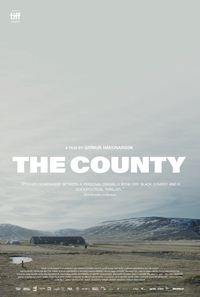The Sorrows of Milk: Hákonarson Returns for More Rural Retribution
 Iceland’s Grímur Hákonarson heads to Norma Rae (1979) territory in the agricultural hinterlands with third narrative feature, The County, a grim predecessor to the redemptive irreverence of his 2015 international breakout Rams, which took home the top prize out of Un Certain Regard at Cannes (and has now been subjected to an English language remake).
Iceland’s Grímur Hákonarson heads to Norma Rae (1979) territory in the agricultural hinterlands with third narrative feature, The County, a grim predecessor to the redemptive irreverence of his 2015 international breakout Rams, which took home the top prize out of Un Certain Regard at Cannes (and has now been subjected to an English language remake).
Staking a claim as a notable contemporary amongst Iceland’s burgeoning film industry, Hákonarson’s latest, while featuring a likeable, unfussy lead performance from Arndís Hrönn Egilsdóttir (of Runar Runarsson’s Sparrows, 2015), is less dexterous than his previous feature in its delivery of an old-fashioned (wo)man against society melodrama which attempts to satisfy too many urges as the film is too realistically low-key to justify its attempts at violence or anarchy and too shortsighted in its character development to exculpate some of its heroine’s more outlandish decisions. A muted dramatization of corporate and communal greed, there’s much to be desired in this latest effort from Hákonarson, which doesn’t quite effectively differentiate itself in any way.
Agriculture cooperatives, at their core, are business organizations meant to maximize the benefits made for and by its members—and as a response to competing with big business by allowing smaller, local communities to remain viable. In a small rural village in modern-day Iceland, however, the very system which was developed as a response to Denmark’s monopoly on trade in the early 20th century is now bleeding its members dry, adopting sinister tactics which have many residents living in fear of bankruptcy should they break any of the co-ops rigid and unyielding rules, such as buying goods at reduced rates outside of the co-up or selling goods to any non-members. When avid co-op champion Reynir (Hinrik Ólafsson) dies in what’s deemed a suicide, his wife Inga (Arndís Hrönn Egilsdóttir) is suddenly made privy to the co-op’s dirty deeds when she learns they blackmailed her husband into tattling on cohorts who broke rules, driving several families to financial ruin in order to save his own farm. Inga takes aim at the co-op’s two-faced director (Sigurður Sigurjónsson of Rams) and launches an attack on social media, the consequences of which are swift. With local news media members as her ally, Inga aims to construct a new dairy farmer’s union so her community can evolve with the times.
Not unlike Rams, Hákonarson returns to themes of historical social rifts which have mutated into dysfunctional realities, once again within the parameters of isolation with this portrait of a small commune lorded over by a corporate-minded co-op. In title and theme, wherein an iron-willed woman must stand toe-to-toe with titans of industry, it also recalls the FHA/farm fiasco thread of Country, the 1984 Jessica Lange melodrama. However, The County pales in comparison to Benedikt Erlingsson’s Woman at War (2018), which is much more idiosyncratic and deals similarly with a woman going to extremes to protect the integrity of her community.
We never really get to know Inga, and much of her dialogue would seem to suggest her heretofore lack of interest in maintaining the farm or honoring her husband’s memory—it’s as if in the moment of his death she’s suddenly allowed or transported into an identity, which in itself would be an interesting angle but isn’t rightly addressed. Instead, she sounds off on Facebook, which annoys the co-op’s rather innocuous leadership and inspires the attention of the local news. This dynamic plays out a bit in the Macedonian film God Exists, Her Name is Petruniya (2019), but Teona Strugar Mitevska’s narrative takes pains to suggest Macedonian journalists are desperate enough to pursue non-sequiturs while nothing about Inga’s social media rants, nor the resulting backlash of broken lawn chairs and manure-tossing altercations builds believably to what we’re supposed to believe is a wild upending of the hornet’s nest. Instead, Inga’s dilemma in The County ends up being resolved as humbly and cozily as a marshmallow liquefying in a cup of hot cocoa, predictably satisfying with little to no resistance. With a scope as awkwardly broad as it is simultaneously myopic, The County is a bit too obvious and a bit too familiar to satisfy anything except for the most basic expectations of its abilities.
Reviewed on September 6th at the 2019 Toronto International Film Festival – Contemporary World Cinema Program. 92 Mins.
★★½/☆☆☆☆☆


